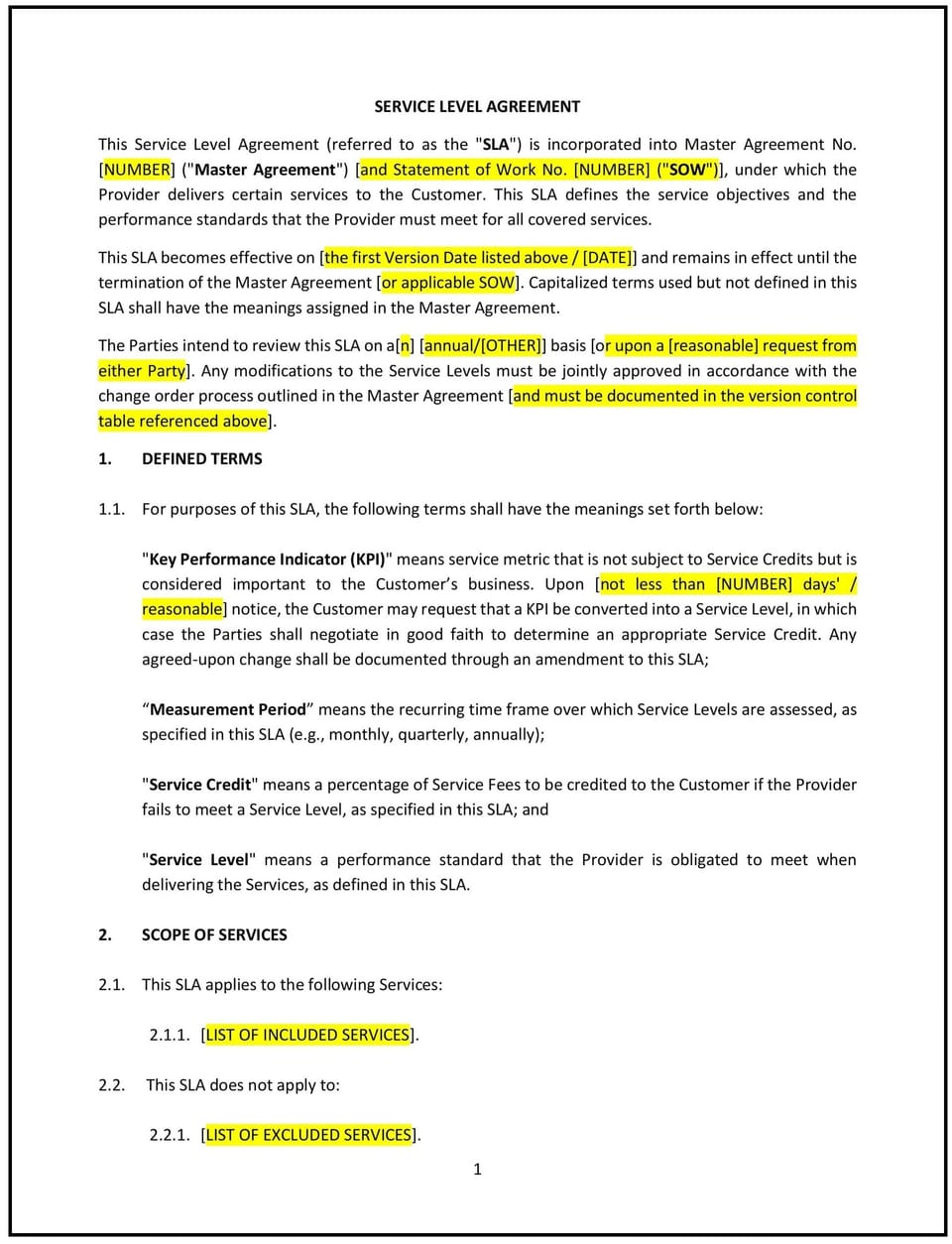Service Level Agreement (SLA) (Utah): Free template

Service Level Agreement (SLA) (Utah)
A Service Level Agreement (SLA) in Utah is a legally binding contract that sets clear expectations for service performance, reliability, and accountability between a service provider and a client. This agreement is essential for ensuring that the provider delivers services at a defined standard and that the client understands their rights and responsibilities. SLAs are commonly used in IT services, cloud computing, consulting, maintenance contracts, and other service-based industries where reliability and performance are critical.
In Utah, SLAs are governed by general contract law principles, with additional compliance considerations depending on the industry. Businesses in regulated sectors such as healthcare, financial services, and telecommunications may need to meet federal and industry-specific legal requirements. A properly structured SLA helps reduce miscommunication, minimizes disputes, and provides a structured way to handle service failures.
Tips for drafting and maintaining a Service Level Agreement in Utah
- Clearly define the scope of services, detailing exactly what is included and excluded. This prevents disputes over what the service provider is obligated to deliver.
- Establish measurable performance standards, such as uptime percentages, response times, and issue resolution deadlines, so both parties know what to expect.
- Outline client responsibilities, including any information, resources, or system access they must provide to help the provider meet the agreed service levels.
- Specify penalties or remedies for underperformance, such as service credits, refunds, or the right to terminate the contract. Utah law allows businesses to freely negotiate these terms.
- Include a dispute resolution process, specifying whether conflicts will be resolved through Utah courts, arbitration, or mediation. Arbitration is often preferred as a faster, cost-effective alternative to litigation.
- Address confidentiality and data security requirements, especially if the service provider handles sensitive information. Federal data protection laws may also apply depending on the nature of the services.
- Review and update the SLA regularly to reflect changing business needs, industry standards, or legal requirements. Outdated SLAs may expose businesses to unnecessary risks.
Frequently asked questions (FAQs)
Q: What should Utah businesses include in a Service Level Agreement?
A: An SLA should include a detailed service description, performance standards, penalties for non-compliance, client responsibilities, dispute resolution terms, and termination rights.
Q: How does a Service Level Agreement benefit small businesses in Utah?
A: It ensures that service providers deliver on their promises, protects businesses from poor service, and provides clear remedies for underperformance. This helps small businesses avoid unnecessary costs and service disruptions.
Q: Are service credits legally enforceable in Utah SLAs?
A: Yes, service credits (discounts or refunds for service failures) are enforceable as long as they are explicitly included in the contract.
Q: What happens if a service provider does not meet SLA requirements in Utah?
A: Depending on the agreement, the client may be entitled to service credits, refunds, or termination of the contract. Legal action may be an option if the breach is severe.
Q: How should Utah businesses handle disputes over SLAs?
A: The SLA should outline how disputes will be handled, including options for mediation, arbitration, or litigation in Utah courts.
Q: Are verbal SLAs enforceable in Utah?
A: While verbal agreements may hold up in some cases, a written SLA provides stronger legal protection and ensures both parties fully understand their obligations.
Q: Can an SLA be modified after signing in Utah?
A: Yes, but any modifications require mutual agreement and should be documented in writing to avoid future disputes.
This article contains general legal information and does not contain legal advice. Cobrief is not a law firm or a substitute for an attorney or law firm. The law is complex and changes often. For legal advice, please ask a lawyer.


